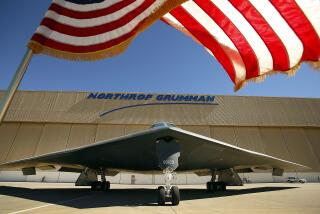Killing a Tigershark
- Share via
Northrop Corp.’s announcement that it is halting work on its F-20 fighter-plane program is a disappointment for the big California defense company, but not a financial disaster. Northrop is already developing the super-secret, radar-evading “stealth” bomber. And just last month it got a $691-million prototype development and demonstration contract from the Air Force that puts the company in a good position to compete for the leading role in a multibillion-dollar advanced-fighter program a few years down the road.
The death of the F-20 project is bad news for the taxpayer, however, because of what it says about the mind-set in the Pentagon.
The F-20 program began in the late 1970s, when the Carter Administration decided that too many Third World countries were spending money that they couldn’t afford for fighter planes that were too expensive to maintain and too sophisticated for their needs. U.S. defense companies were encouraged to develop a cheaper high-performance fighter specifically for purely commercial sale to such countries.
Northrop, taking Washington at its word, invested more than $1 billion of its own money--almost unheard of in the defense business--and produced the F-20 Tigershark without benefit of a government contract. Whereupon the Reagan Administration, with its supposed dedication to competitive enterprise, came into office and proceeded to undercut Northrop by pushing sales to Third World customers of F-16s, which had come up through the Pentagon bureaucracy’s standard design and acquisition process.
The Administration action was not based on any finding that the Tigershark was unsuitable or inferior. But it dealt a body blow to Northrop’s F-20 sales effort because potential customers tended to prefer a plane that was in use with the U.S. Air Force to one that wasn’t. Northrop concluded that only a U.S. Air Force purchase of the F-20 would convince overseas buyers that it, too, was a first-class fighter.
In its efforts to win an F-20 production contract from a frankly uninterested Pentagon, Northrop did some things that could bear emulation. The company, for example, offered a guaranteed price per delivered aircraft, including all equipment and support--a refreshing departure from the normal way of doing business, in which defense companies get contracts with artificially low bids, then collect on cost overruns.
General Dynamics, manufacturer of the F-16, was forced as a consequence to sweeten its own price to the Air Force for follow-on contracts. Three weeks ago the Air Force announced that it had chosen a modified F-16 for its air-defense fighter in preference to the F-20.
In final dollars-and-cents terms, the decision on that one deal probably made sense. But the modified F-16 would not have been offered at the cut-rate price without the competition presented by Northrop’s privately financed F-20. And it will be a long time before another company risks big money to develop a major weapon system outside the Pentagon bureaucracy’s preferred way of doing business.
That’s bad news for taxpayers.
More to Read
Inside the business of entertainment
The Wide Shot brings you news, analysis and insights on everything from streaming wars to production — and what it all means for the future.
You may occasionally receive promotional content from the Los Angeles Times.










